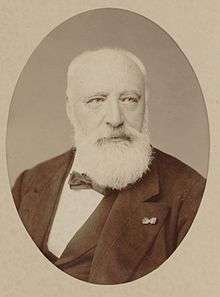Victor Frédéric Verrimst
Victor Frédéric Verrimst (29 November 1825 in Paris – 16 January 1893 in Houilles) was a French double-bassist and composer.

Biography
Of Belgian ancestry, Verrimst studied double-bass at the Conservatoire de Paris in Louis François Chaft's class as well as harmony with Antoine Elwart and counterpoint with Simon Leborne. A winner of the first prizes in these disciplines, he became a musician in the orchestra of the Opéra-Comique then was bassist soloist with the orchestra of the Opéra de Paris, at the Orchestre de la Société des Concerts du Conservatoire and played in the personal music of Napoleon III.
Verrimst was also maître de chapelle of the église Saint-Thomas-d'Aquin then of the Church of Saint-Bernard de la Chapelle and double-bass professor at the Conservatoire de Paris. In this capacity, he was the author of a Complete method for the double bass,[1] in use at the Conservatoire, as well as a Solfège du contrebassiste.[2] But Verrimst did not limit himself to writing for the double-bass. He composed several masses and motets, various melodies and pieces for piano, a fantasy for trombone, as well as an important collection of harmonized rounds and popular songs, published in two volumes.
Bibliography
- François-Joseph Fétis, Biographie universelle des musiciens et bibliographie générale de la musique, volume 8, Paris, Firmin-Didot, 1867, (p. 331).
- François-Joseph Fétis and Arthur Pougin, Biographie universelle des musiciens et bibliographie générale de la musique : Supplément et complément, volume 2, Paris, Firmin-Didot, 1880, (pp. 616–617).